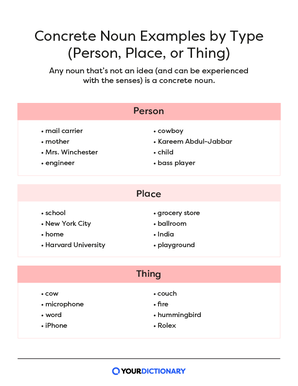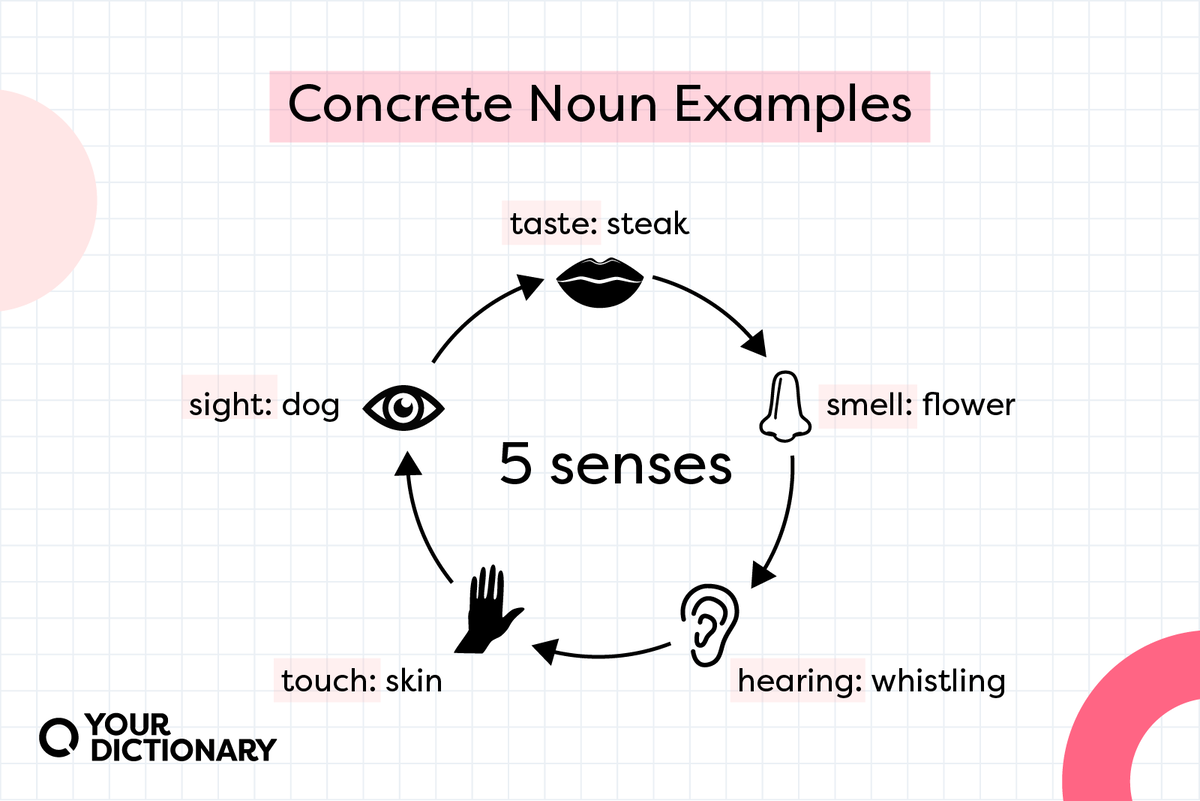

A bird is a concrete noun. That delicious cookie is a concrete noun. Your favorite band is a concrete noun. Even concrete is a concrete noun. Concrete nouns are all around you — just look, listen, smell, taste, and feel them. (Be careful with the actual concrete, though.)
What Is a Concrete Noun?
A concrete noun is a person, place, or thing you experience through one or more of your five senses. If you can’t see, hear, taste, touch, or smell it, it’s not a concrete noun.
For example:
- I pet the soft, fluffy cat in my lap. (You can feel a cat.)
- Can you hear that lovely classical music? (You can hear music.)
- Rachel could smell her grandmother’s apple pie as soon as she walked in. (You can smell pie.)
- The savory soup tasted like a combination of root vegetables and broth. (You can taste soup.)
- Harry watched the Toyota pull away from the parking lot. (You can see a Toyota.)
Concrete nouns can be common nouns, which refer to a general person and aren’t capitalized (like cat), or they can be proper nouns that describe a specific person and are always capitalized (like Toyota).
Concrete Noun vs. Abstract Noun
Concrete nouns are different from abstract nouns, which are ideas and concepts. People, places, and things can be concrete nouns — but not ideas.
For example, you can’t see the abstract noun happiness, but you can see the concrete noun smile and hear the concrete noun laughter.
Examples of Concrete Nouns by Sense
Concrete noun examples are everywhere. Although you can experience most of them with more than one sense (you can see, smell, taste, and feel cupcakes, for example), they’re grouped below by their primary sense.
Concrete Nouns for Sight
Whether they’re objects in your office or animals described in a book, these concrete nouns are visible.
- suitcases
- Susan
- soccer ball
- Ferrari
- burrito
Concrete Nouns for Hearing
Can you hear that? It’s the sounds of concrete nouns ringing through the air.
- chirps
- music
- explosion
- whistling
- snoring
Concrete Nouns for Touch
If you can feel a noun using physical touch (not emotions), it’s a concrete noun.
- rain
- sandpaper
- silk
- coins
- fur
Concrete Nouns for Smell
Some concrete nouns smell wonderful — others, not as much.
- flowers
- skunks
- perfume
- sunscreen
- garlic
Concrete Nouns for Taste
Although you shouldn’t try to taste every concrete noun, you can describe the ones that do have a taste accurately.
- sugar
- medicine
- peas
- chocolate
- steak
List of Concrete Nouns
While you can group concrete noun examples by the primary sense used to experience them, you can also group examples by the type of noun (person, place, or thing).

Different Types of Concrete Nouns
Concrete nouns can also be different types of nouns, such as singular nouns (basketball player), plural nouns (basketball players), proper nouns (LeBron James), collective nouns (team), and more. As long as you experience them with one of the five senses, they’re concrete nouns.
- common noun - not capitalized and refers to general people, places, and objects (woman, city, book)
- proper noun - capitalized and refers to a specific, named person, place, or thing (Jane, New York, the Bible)
- collective noun - a group of objects that are a collection or unit (family, class, herd)
- possessive noun - noun that possesses other nouns (Sarah’s, Peter’s, the cat’s)
- countable noun - noun that can be counted (one car, two dogs, a million pieces)
- uncountable noun - noun that can’t be counted (luggage, milk, electricity)
Concrete and Abstract Noun Practice
Can you tell which of the bolded nouns below are concrete and which are abstract? (Hint: Watch for context clues that reveal which nouns access the five senses.)
- Can you bring your yummy apple cobbler to dinner?
- I’ve felt nothing but sadness since Marcy left.
- Americans are entitled to liberty.
- Don’t add so much butter to the potatoes.
- Does this test really measure your intelligence?
- Let’s visit Grandma this weekend.
- This chair is really uncomfortable.
- Did you watch the game last night?
Concrete and Abstract Noun Practice Answers
Could you tell the difference between the nouns?
- Can you bring your yummy apple cobbler to dinner? (Concrete - You can experience cobbler with the senses.)
- I’ve felt nothing but sadness since Marcy left. (Abstract - You can’t see, touch, hear, smell, or taste sadness.)
- Americans are entitled to liberty. (Abstract - You can’t see, touch, hear, smell, or taste liberty.)
- Don’t add so much butter to the potatoes. (Concrete - You can experience butter with the senses.)
- Does this test really measure your intelligence? (Abstract - You can’t see, touch, hear, smell, or taste intelligence.)
- Let’s visit Grandma this weekend. (Concrete - You can experience Grandma with the senses.)
- This chair is really uncomfortable. (Concrete - You can experience a chair with the senses.)
- Have you ever visited Hungary? (Concrete - You can experience Hungary with the senses.)